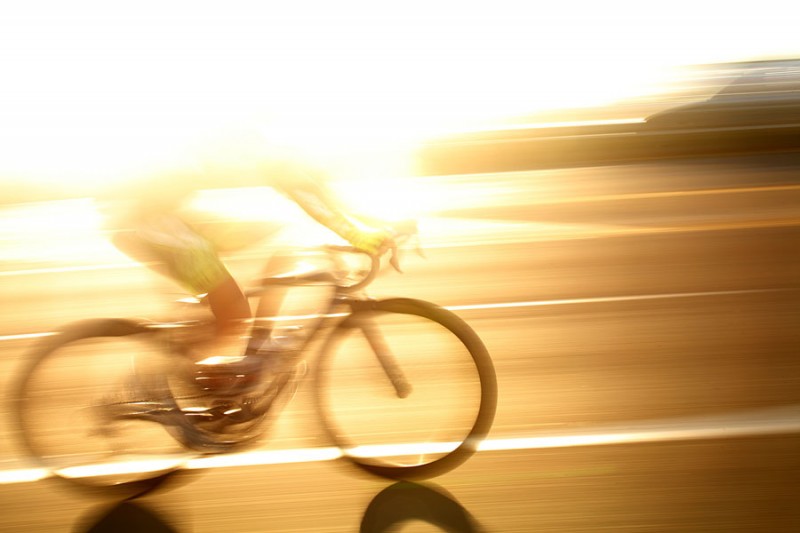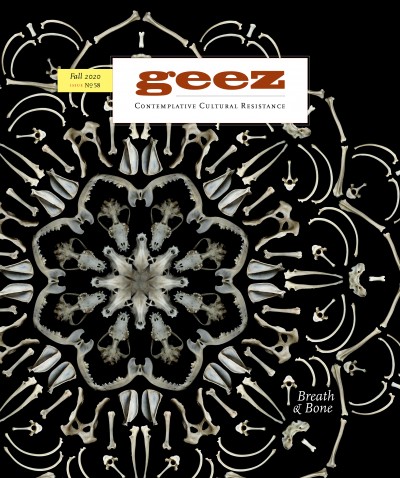Community Acts of Remembering and Resistance

An ethereal bike rider on a coast road in Encinitas, CA, February 2014, Jonathan Cohen CC.
Beyond the borders of church, communities are crafting practices of remembering on their own terms.
What I have learned about mourning in the streets has prompted me to dig deeper into my Christian roots, pulling forward ways of caring for, and remembering, the dead that have been covered over with weeds. These liturgies in public space have reinforced my understanding of liturgy in its original terms – work of the people.
Memorial Bicycle Procession: Bearing Witness That a Better City Is Possible
Three years ago we heard the terrible news that a child was killed in a bike accident on a pathway near our house, one that I rode often with my young daughter. A local cycling organization in Toronto faithfully organizes a memorial ride for each fallen cyclist, and this was no exception. I was one of many parents feeling as if my heart was in shreds. I spoke through tears with another mom about our presence in the name of this child, Xavier, but also that of our own children. The organizers invited the folks with kids to pace the ride at the front while some of the most skilled cyclists in the city took their place behind – equity in motion.
The ride was a silent, solemn procession – a powerful witness on busy city streets. As with every memorial ride, the lead bike pulled a trailer with a ghost bike to be installed at the site of the accident. Once there, we formed another procession, this time with our bodies to show where a barrier should have been. Led by community activists, these bicycle processions create a space for mourners to grieve and clear a channel to direct our outrage at preventable deaths. With our bikes and our bodies, we bear witness and enact hope that another city is possible. Memorial rides claim public space for remembering and create momentum to resist injustice.
My bicycle has helped me recover the significance of an intentional act of accompaniment. Like their Jewish ancestors, early Christians were accustomed to funeral processions. They also processed with the bones of the martyrs, carrying them from their burial place to where they would be enshrined. In Ireland and Scotland, some of the places of my ancestry, the well-worn footpaths on the way to the gravesite were known as corpse-roads, marked with places to stop and rest. Mostly, for Christians, this practice has slipped away, and yet I reclaim it in this expansive contemporary form.
Annual Strawberry Ceremony: Coming Together to Say No More Stolen Sisters
Over the years, I have been drawn into women-led circles who gather to say names and share stories of missing and murdered Indigenous women, girls, and two-spirit people. Each Valentine’s Day, in front of the Toronto police headquarters, an Elder gathers the community for a Strawberry Ceremony to honour the sisters stolen from these territories. February is not the time for strawberries, but these healing fruits are necessary to console families and friends who mourn untimely deaths. Group banners are left at home and all are invited to lift up signs with names and photos, a witness to lasting love and remembrance. There is grief and there is anger at the racist indifference that belittles and slows investigations and adds layers to a family’s pain and accumulating trauma across generations.
At this year’s ceremony, a woman invited us to look at our neighbour, a stranger, and say, “I will look for you,” reweaving the bonds between us – Indigenous and non-indigenous – broken by racism and colonization. Every year this gathering creates a sacred circle of remembering. Every year we gather to say “no more stolen sisters” until we have to gather no longer. Hearts and communities heal, not by letting go, but by carrying losses together. Mourners and activists – we resist violence and speak truth to power.
Calling the names of the ancestors may be familiar to those of us who grew up in catholic traditions. In my own faith community, we continue to uphold this practice, never feeling constrained to stick to the “authorized list of saints.” We mix them up with artists and activists who have gone before, including our own ordinary folks in the mix. Mostly though, this remembering practice is shared inside the walls and connects only those gathered for worship. Community acts of remembrance amplify the call so much more.
Calling of names in public space (or virtually now through social media) widens this arena of engagement between the living and the dead. White Western society has broken the bond between these worlds, exiling practices of caring for the dead to the realm of the trained professional caregiver. Remaining “attached to the dead” risks appearing, at best, emotionally indulgent, and at worst, pathological. But thankfully, beyond whiteness, there is much cultural wisdom that knows the value of saying their names, remembering their lives, honouring their commitments, and carrying our losses together. Cultures who are still ancestrally alive have much to teach, and while I have been blessed to learn from them, I must do my own work and wrestle with both the blessing and the burden of my own tradition.
Strengthening the Movement
Remembering the dead is restorative for movements. When we don’t know the names of those who went before us, we become detached from the strength of collective inheritance. Communities informed by the theologies of liberation know the generative power of memory.
The practice of calling ¡presente! – claiming the presence of those gone before us in the struggle – is a gift of that movement to all others. The strands of the stories between us are “thickened” when communities remember their dead and purposefully gather to the prophets, preachers, and change-makers that went before. Our lives intertwine with theirs when we carry on the work of repairing the world in their name. When Berta Cáceres, the beloved Indigenous ecological activist from Honduras, was murdered in her home in 2016, people refused to let go of what she believed. “Berta no murió, se multiplicó! Berta didn’t die, she multiplied!” has been a rallying cry at protests and vigils from Tegucigalpa, Honduras to Washington, D.C. Remembering those who stood up yesterday draws down strength for those standing up today.
Remembering lives that were stolen by systemic violence disrupts the legitimacy of powers that continue to oppress. Geneviève and the thirteen other women killed in Montréal, Québec speak today in movements that resist men’s violence. Helen Betty Osborne and Tina Fontaine live on in the struggle for justice for Indigenous women, girls, and two-spirit people. George Floyd’s name delegitimizes state violence against Black men and exposes the pandemic of systemic racism that grips both Canada and the U.S.
In the words of Isaiah, it is the oppressed and the broken-hearted who repair the ruined cities, who are called the planting of God (Isaiah 61:1-4). It is the mourners who build up and repair. The mourners and the activists are one and the same.
It’s time to show up as mourners, to move alongside (or pedal, as the case may be) the crowds who are raging at injustice, carrying our losses, and drawing down the great cloud of witnesses to embolden us as we build up and repair the ruined cities.
Susie Henderson (she/her) is a queer, white, mostly-settler woman, and an intentionally unlicensed practitioner of community-based deathcare, living in Tkaronto/Toronto, Ontario.



Start the Discussion